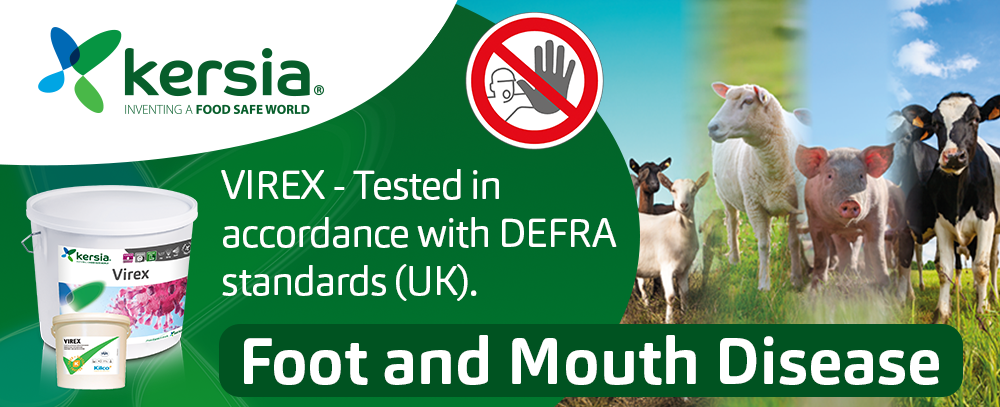Newcastle Disease (ND) is a highly contagious viral infection with significant implications for both the poultry industry and wild bird populations. It is caused by a virulent strain of avian paramyxovirus type 1, posing a severe threat to the health and well-being of birds and can have devastating economic and social effects on the poultry industry. Comprehensive preventive measures including biosecurity measures are crucial to mitigate the risk of outbreaks on poultry farms.

What are the symptoms of Newcastle Disease virus (NDV) in infected poultry?
NDV can cause infection and clinical signs in a variety of bird species, and the severity of the disease can vary depending on factors such as the virus strain, the age, health, vaccination status of the birds. The most common symptoms of Newcastle disease in infected poultry include:
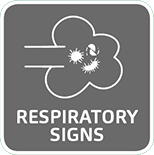 |
Respiratory signs: Coughing, sneezing, gasping for air, nasal discharge, swelling of the eyes and face, difficulty breathing (dyspnea) |
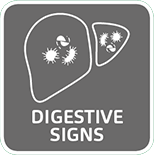 |
Digestive signs: Diarrhea, greenish, watery feces, which is sometimes referred to as “green diarrhea”, leading to reduced feed and water consumption (most predominant form of signs) |
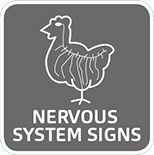 |
Nervous system signs (Neurological form, often in virulent strains): Head and neck twisting (torticollis), paralysis of the wings and legs, tremors, incoordination, circling or spinning, paralysis and death |
 |
Drop in egg production/quality: Infected laying hens may experience a sudden drop in egg production, or eggs may have thin shells and irregular shapes. |
 |
Reduced activity and morbidity: Infected birds often appear lethargic, depressed, and have a decreased appetite. |
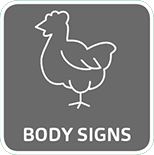 |
Swelling of the combs and wattles: In some cases, the combs and wattles of infected birds may become swollen and purplish in color. |
 |
Increased mortality: Depending on the virulence of the virus and the susceptibility of the bird population, Newcastle disease can lead to high mortality rates, especially in unvaccinated or improperly vaccinated flocks. In unvaccinated flocks, mortality can reach up to 100%. (CFSPH, 2016) |
 It’s important to note that the symptoms of Newcastle disease can overlap with those of other respiratory and gastrointestinal diseases in poultry. A definitive diagnosis typically requires laboratory testing to confirm the presence of the Newcastle disease virus.
It’s important to note that the symptoms of Newcastle disease can overlap with those of other respiratory and gastrointestinal diseases in poultry. A definitive diagnosis typically requires laboratory testing to confirm the presence of the Newcastle disease virus.
If you suspect Newcastle disease in your poultry flock, it is essential to isolate affected birds, report the outbreak to relevant authorities, and seek the assistance of a veterinarian for confirmation and guidance on disease control measures. Rapid containment and control measures are crucial to prevent the spread of the virus to other poultry and mitigate economic losses in the poultry industry.
How is Newcastle Disease transmitted?

Through Direct Contact:
Newcastle Disease virus (NDV) can be transmitted through direct contact between infected and body discharges from susceptible birds (young birds are more at risk). This includes close contact such as beak-to-beak contact, mating, and fighting.
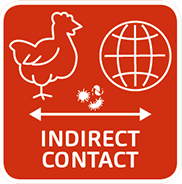
Through Indirect Contact:
The virus can survive in the environment for varying lengths of time, depending on factors like temperature and humidity. Contaminated feed, water, equipment, and clothing can all serve as vehicles for indirect transmission.
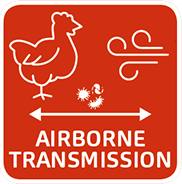
Through Airborne Transmission:
Newcastle disease virus can be aerosolized, especially in crowded or poorly ventilated poultry facilities. Infected birds can release virus-laden respiratory secretions into the air, infecting nearby birds.
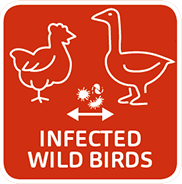
Through Infected Wild Birds:
Wild birds, particularly waterfowl and migratory birds, can carry and transmit the virus to domestic poultry when they come into contact with them or their environment.
What measures can be taken to prevent Newcastle Disease?
Vaccination
Vaccination is one of the most effective methods to prevent Newcastle disease in poultry. There are different types of vaccines available, including live and inactivated vaccines. The choice of vaccine depends on the specific circumstances and local regulations.
Biosecurity / Hygiene Measures
Implement strict biosecurity measures on poultry farms to minimize the risk of introduction and spread of the virus. This includes limiting access to the farm, disinfecting equipment, and keeping a clean and hygienic environment.
 Cleaning & Disinfection
Cleaning & Disinfection
- Keep poultry housing and equipment clean and disinfected regularly to prevent virus buildup.
 Protection – by means of hygiene management
Protection – by means of hygiene management
- Offer possibilities and make it obligatory to disinfect boots, wheels, vehicles, hands and equipment prior to and after entering the premises or different areas of the premises.
- Cleaning and disinfection of the water system & water disinfection
- Product selection, concentration and application is key to successful protection.
 Protection – by means of structural management
Protection – by means of structural management
- Controlled Movement: Limit the movement of birds between farms and restrict access to non-essential personnel to prevent the introduction of the virus.
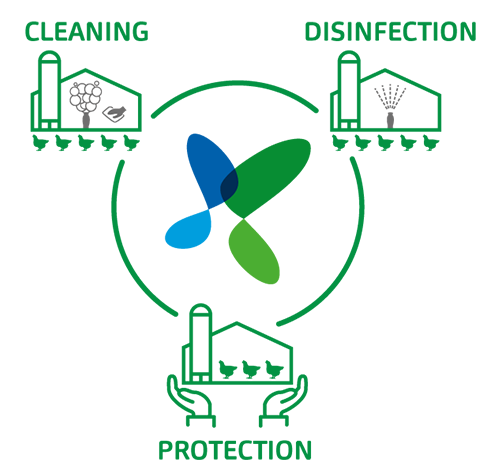

In addition, management of water quality is also a pillar of a successful hygiene management:
|
Cleaning phase with adapted detergent Disinfection and Protection.
|

Cleaning phase with adapted detergent
Disinfection and Protection.
Disinfectants tested against Newcastle virus disease.
- HYPRED FORCE 7
- Viroshield + (DEFRA approved)
- VIREX (DEFRA approved)
- FUMAGRI OPP (secondary disinfection, Dispersion by ULTRADIFFUSION®)
- FUMAGRI EFFISAFE (boots and vehicles) for surface & equipment
In addition, management of water quality is also a pillar of a successful hygiene management:
- Aquatabs®
For complete information on products and availability according to local regulation
please contact: [email protected].
Quarantine
Isolate new birds for a period before introducing them to the existing flock to ensure they are disease-free.
Surveillance & Monitoring
Regularly test birds for the presence of Newcastle disease virus, especially if you are in an area with a history of outbreaks.
Education & Training
Educate farm workers and poultry owners about the signs of Newcastle disease and the importance of reporting suspected cases promptly.
In the Event of an Outbreak: Reporting & Culling
In the event of an outbreak, report it to the appropriate authorities, and cull infected and exposed birds to prevent further spread.

